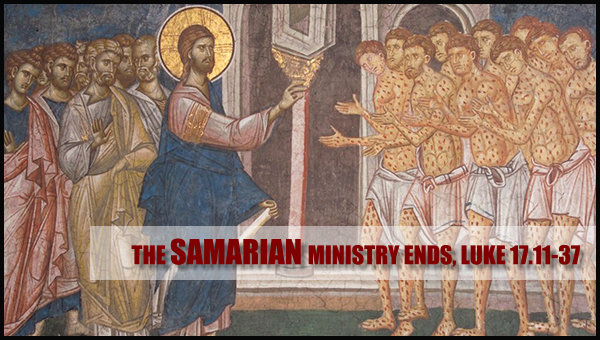By Tyson Thorne

The Samarian Ministry at Various Cities (9.51-18.34), 17.11-37
Today we find ourselves at a crossroads, the closing of the Samarian ministry and the beginning of the Judean. Jesus is approaching Jerusalem and his final battle. Somewhere in a region between Samaria and Galilee Jesus comes across 10 lepers, some of whom are Jewish and some Samaritan. Together they called out to the Messiah from a distance (lepers were not permitted to mix with healthy society), calling him “Master” and asked for mercy. Jesus did not approach the group, there was no laying on of hands, nor did he speak his now famous line, “your sins are forgiven.”
Instead, Jesus instructed the lepers to report to the priests, something which was only to be done when the disease was no longer at a visible stage. This was not the case for these men, they had clearly visible sores. As they obediently walked to the synagogue the disease instantly healed. What might of happened if one of them had stayed behind, waiting for the disease to vanish before obeying? No one can know with certainty, but since faith is often credited for Jesus’ miracles it would stand to reason that such a person would not have been healed. There are times we must obey in faith even when there are no visible signs that God will come through for us.
Before the group reached the priest, they noticed that the disease had abated. There is a ceremonial cleansing ritual that must be performed after being inspected by the priest before one could re-enter the society. Undoubtedly their minds were fixed on the road ahead, all but one of them, who returned the way he had come to thank Jesus and praise God. The former leper now threw himself face down at Jesus’ feet, a posture of worship indicating he believed Jesus came in the power of God. There is little doubt that he received more than physical redemption that day.
Later that day a group of Pharisees asked Jesus when the Kingdom would come. Once more he answers them cryptically, but indicating that he is the Kingdom they should be seeking:
The Kingdom of God is not coming with signs to be observed, nor will they say, ‘Look, here it is!’ or ‘There!’ For indeed the Kingdom of God is in your midst.
The translation of entos hymon is literally “within you” but is better translated as it is here, “in your midst.” Jesus could not have been telling the Pharisees, who rejected Jesus as the Messiah, that the Kingdom was within them as if it were some spiritual (as opposed to a physical) kingdom. He then turned to his disciples to further the discussion.
He explained that while a time will come when the desire to see one of the days of the kingdom coming in it fullness, they will not see it. This should have convinced the disciples that Jesus was not going to usher in the Kingdom now, for they would die without having seen that day. Jesus too would die under the rejection of their generation (verse 25). This is one reason they should not be taken in by those who testify that Jesus has returned, the other is that when Jesus returns it will not be under the humble circumstances of his first coming but instead would be a spectacle seen by all humanity, like lightening the flashes from one end of the sky to the other. For this later reason, we should also not be taken in by any who claim to be the Messiah in our time.
Not only will the return of the Messiah be visible to all, it will come suddenly and surprisingly even as the flood did during Noah’s day and as judgment did to Sodom and Gomorrah. These comparisons with dramatic judgments are purposeful, for his coming will also be one of judgment – one that none can escape. For this reason one who relaxes on his roof (most rooftops in Israel are flat) should not go into his home to rescue his belongings when that day comes, nor should any working in their fields try to return home to save their belongings, for such people will end up like Lot’s wife. Whoever tries to save themselves and their possessions from judgment will lose it all. In some parts of the world it will be night time and people will be in bed, in other parts it will be day and they will be at work, but in either case one will be taken in judgment (not raptured as some believe), and the others will remain to enter the Kingdom.
The disciples then asked a question that naturally occurs to the reader as well, “Where” will these people be taken to? Jesus answers, “Where the dead body is the vultures will gather,” indicating that, like the dead, they will be taken into judgment.
|
|